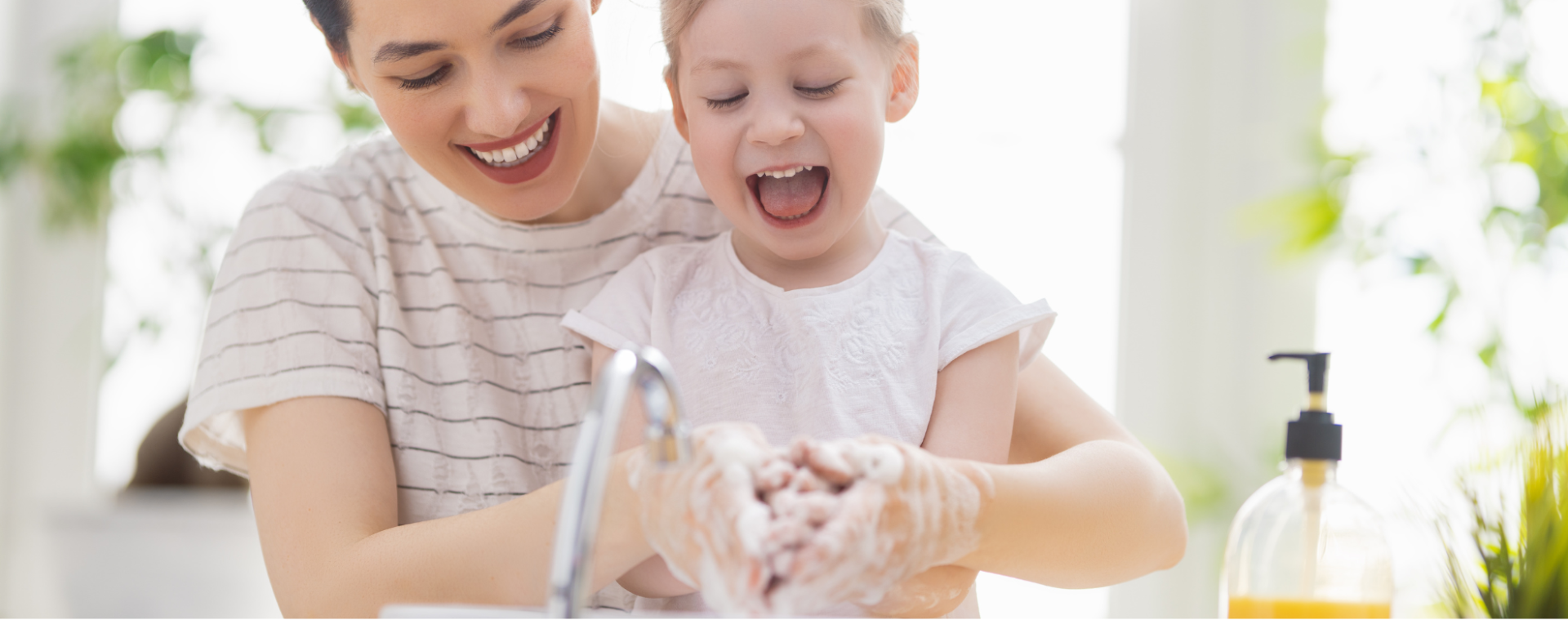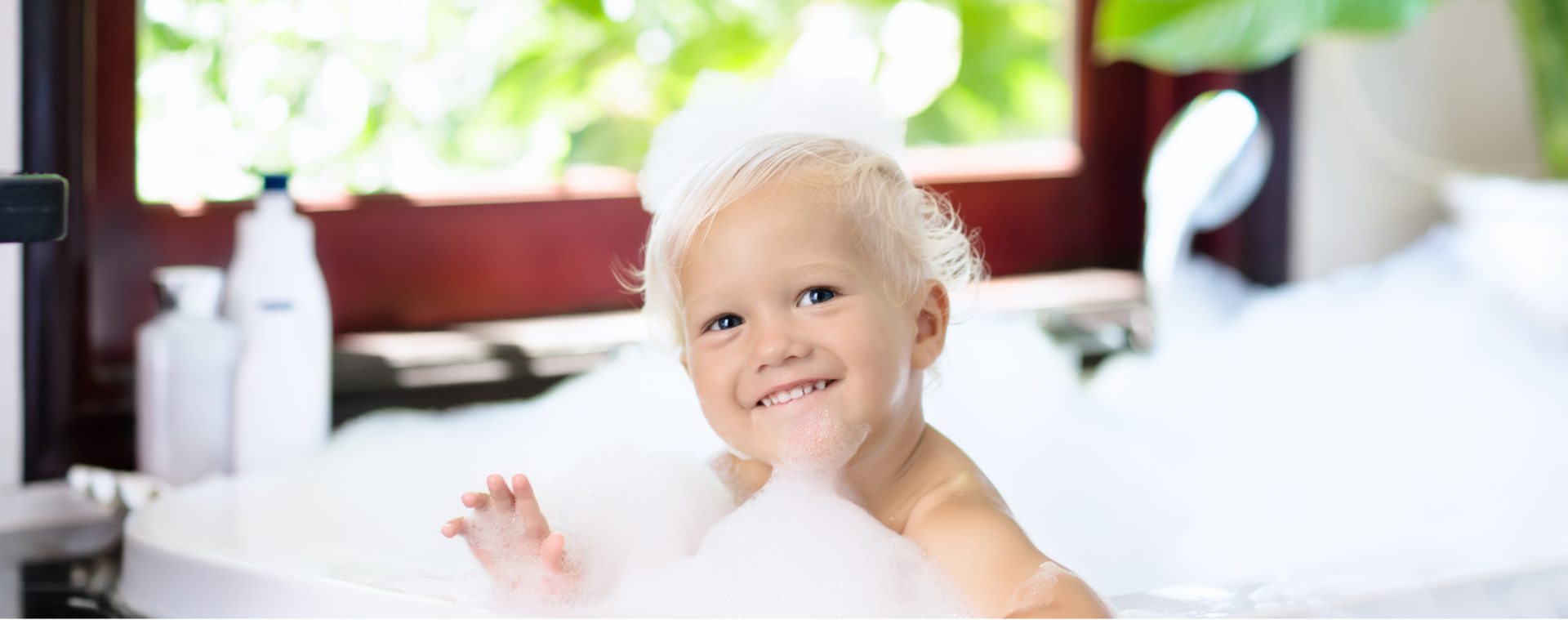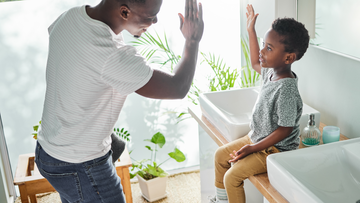Parents do a lot for their kids – helping with their homework, packing school lunches, and bedtime stories. At the same time, they teach their children how to be independent. One of the lessons parents should impart is proper personal hygiene.
According to the Centers for Disease Control and Prevention (CDC), frequent handwashing and maintaining hygiene routines can prevent multiple diseases and illnesses. By teaching our kids how to stay clean, we teach them how to take care of their bodies in small ways everyday.
Global Handwashing Day is just around the corner. In celebration, we’d like to emphasize the importance of personal hygiene for children — how to teach them to properly wash their hands (and other personal hygiene habits) and how Sanicare can help with all your hygiene needs.
Why Is It Important to Teach Hygiene to Children?
Personal hygiene is an important form of self-care that ensures your kids will enjoy good health. Forming regular hygiene practices early on will positively impact their growth and development. Since they are exposed to germs every day, a proper hygiene routine ensures they are always in good shape.
How Do You Teach Kids Proper Hygiene?
Understanding the concept of personal hygiene is important for children. But teaching them can be a challenging process, especially if you have fussy or impatient kids.
Fortunately, there are different ways to make learning fun for your children. Consider the following:
Handwashing

Kids have a bad habit of touching their mouth and face with dirty hands, which increases their risk for bacterial contamination. If there is anything we learned from the pandemic, it’s that proper handwashing saves lives.
Encourage them to wash their hands with water and soap for at least 20 seconds. Run them through the following steps:
- Wet both hands
- Apply liquid hand wash or regular soap to their hands
- Rub thoroughly to lather the soap
- Clean everything – from under each nail to all the fingers
- Rinse
- Dry hands
Also, teach your children when to wash their hands. Remind them to do so after they:
- Use the toilet
- Cough or sneeze
- Touch their pets or other animals
- Play outdoors
- Eat their food
- Clean the house
- Visit a sick person
Even when you are traveling or on the go, teach your child to practice routine hand hygiene. Instead of carrying a bottle of liquid hand soap, use paper soap instead. Sanicare Clean Hands Soap Thins is the perfect companion for you and your kids. All you need is a sheet of soap to wash your hands wherever you are. Plus, they come in two refreshing scents: Fresh Paradise and Ocean Rush.
If soap (in any form) is unavailable, wash their hands with alcohol or sanitizer. Make sure they have a bottle of Sanicare Clean Hands Alcohol Spray (available in Peach Blossom and Zesty Bergamot) in their backpack or lunch box. Formulated with 65% alcohol, a spritz of this alcohol prevents the spread of germs while moisturizing the skin at the same time.
Does your child have sensitive skin? Or are you concerned with using alcohol for your baby? No worries. Sanicare’s Foaming Hand Sanitizer will do the trick! Its non-drying formulation is alcohol-free and ideal for sensitive skin.
Oral Hygiene

Like adults, kids should brush and floss their teeth at least TWICE a day (in the morning and at night). Give them a pea-size amount of their fluoride toothpaste and teach them to brush thoroughly for at least two minutes. Kids under 7 years old might need some assistance.
Here’s a checklist of things you shouldn’t miss when teaching them how to brush:
- Give your children toothbrushes specifically made for them. Since they are smaller, they have softer gums that are still developing. Adult toothbrushes might cause bleeding. Instead, go for toothbrushes for kids like Doctor Plotka’s Mouthwatchers Toothbrush (Youth Soft). This kid-friendly toothbrush has soft, dual-layered flossing bristles that can clean hard-to-reach places. It is also available in fun colors like pink and yellow.
- When your kid’s first tooth appears, clean it gently with a soft toothbrush and water.
- Teach them how to brush their teeth. The easiest way to do so is to brush your teeth with them.
Bathing and Showering

Include baths and showers as a part of your child’s bedtime routine or end-of-day routine. In the beginning, bath times are your responsibility until they can do it themselves. However, you can start teaching them how to properly bathe. At the same time, teach them how to wash their hair without getting shampoo or soap in their eyes.
Make sure they wash all parts of their body, including under their arms, their genital area, and between their toes. Teach them how to thoroughly dry their bodies before getting dressed.
Toilet Use

The toilet is one of the dirtiest places at home. Plenty of bacteria, viruses, and microorganisms grow on its surface; in fact, the average toilet seat houses 50 bacteria per square inch. If your child is not careful, they could get sick when they use it. To avoid diseases, teach your kids the right way to maintain toilet hygiene.
Start by teaching them how to wash and wipe after using the toilet. They should also wash their hands to avoid spreading germs. If they don’t have access to water, Sanicare’s Cleansing Wipes are a good alternative.
Personal Hygiene When Sick

Kids are prone to colds, coughs, and seasonal sicknesses. During sick days, children must still practice proper hygiene to prevent the spread of germs to others.
Teach them to cover their mouth and nose when they sneeze or cough. Also, they should refrain from just using their hands when doing so. Encourage them to use a handkerchief or tissue paper. Make sure you have a pack of Sanicare’s Handy Pack Multi-Purpose Tissue at hand so they can grab a sheet whenever needed.
How to Encourage Good Hygiene Habits

Most parents ask, “How can I help my child with their hygiene?”
- Start early. Teach them about the importance of grooming and hygiene when they are toddlers. Eventually, let them try to do these tasks alone (with you present). By the age of six, encourage them to do their routine on their own.
- Establish hygiene routines as a daily responsibility. Always talk to your kids about the importance of personal hygiene. What happens if they don’t wash their hands or brush their teeth? Answering these questions will teach them to be responsible for themselves.
- Check in frequently. Once your child can manage their routines, check in now and then to make sure they are doing well.
- Be a good role model. One of the best ways to encourage new habits is to keep up with yours. When your kids see you slacking off your hygiene routines, they might do the same thing. Set the standard so your kids can catch on.
- Promote proper hygiene as a form of self-care. There’s more to personal hygiene than just caring for your body; it’s also learning how to love yourself. Emphasize to the kids the importance of self-care so they can be more comfortable with themselves when they get older.
How to Deal with Kids that Push Back on Personal Hygiene
Sometimes, kids aren’t big fans of brushing their teeth or showering. They’d rather play or refuse to be told what to do. If you are struggling with implementing a proper hygiene routine with your children, there are different approaches to try.
- Offer incentives. Encourage younger children with rewards once they do their hygiene routine. Just a tip: avoid begging your kids to do something in exchange for a treat. It might trigger a power struggle that can cause issues when they grow up.
- Discuss the consequences. Emphasize the importance of this new routine with the consequences of not doing it. For example, if they don’t brush their teeth, they might get cavities. If they don’t wash their hands, they could spread germs to you and others, which can cause people to get sick.
- Refrain from comparing. Comparing your child to someone else might discourage them. Instead, practice patience and give them time to adjust.
- Use educational resources. Some videos and books can teach personal hygiene to children in an entertaining manner. Look for a fun video that the kids can watch while they brush their teeth. For adolescents, books are great resources for how to care for their changing bodies.
- Explain, do not scold. Parents tend to scold their kids if they aren’t obeying. Remember that some children are too young to understand the importance of a good hygiene routine. Explain to them why they should maintain a routine. Teach them about good and bad habits. Also, offer examples so they can understand better.
Personal hygiene is an important lesson to impart to your kids as they grow up. It ensures that they are always fit to do school and the things they love. Always keep them happy and healthy by teaching them the basics of handwashing, showering, and other cleanliness routines.
Complete these routines with Sanicare, your hygiene partner! Add your favorite hygiene essentials to your cart today.




